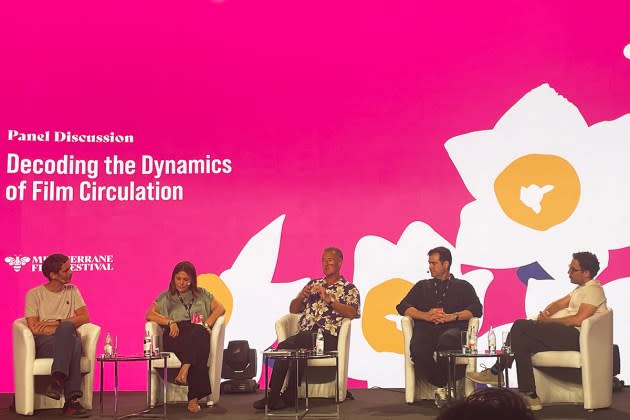Neon Exec Says Independent Movies Need to Be Events, Claims Producing Arm Means Taking ‘Fewer Chances’ With Acquisitions

As distributors develop a more robust production arm, it means taking “fewer chances” with acquisitions, says Jeff Deutchman, president of acquisitions and production at Neon.
Speaking at an industry panel on film circulation at the sophomore edition of the Mediterrane Film Festival, the American executive said, “Because Neon and some of our competitors are producing films, by the time we go to festivals like Sundance or Cannes, our slate is 60-70% formed. When we were purely an acquisitions company and relied entirely on festivals to populate our slates, we could take more chances.”
More from Variety
Deutchman added that making an event out of film releases is no longer a requirement only for big Hollywood productions, with independent films also demanding an event component to attract scarcer audiences to cinemas.
“Fewer films are working theatrically. Consumers are pickier and independent films have to be an event. I don’t have an actual checklist but I have a good idea of what it is on my mind.”
The executive went on to mention some of the features that help turn an independent film into a happening: “A name brand director always helps, so does an actor who doesn’t work very often — a Daniel Day-Lewis or Frances McDormand — or an actor doing something you’ve never seen them done before. Films that need to be experienced communally, like a comedy or concert film, or movies that serve an underserved audience. The most important thing however is uniqueness. That’s the highest premium we put on anything, movies that are incomparable, that you haven’t seen before. That’s a really strong position to be in when it comes to a sophisticated theatrical audience.”
“To eventivize a film, the film does 50% of the work. The other half is between an old-fashioned carnival barker and a full-service concierge. We are paying very close attention to every detail to customise a bespoke distribution strategy,” Deutchman concluded, going on to cite the marketing campaign for Osgood Perkins’s upcoming “Longlegs,” which saw Neon planting encrypted messages on newspapers and launching a website that appeared to be designed by a conspiracy theorist.
“We want to understand what are some of the unusual things we can do to engage with an audience, things that are going to make them feel invested in a movie six months before release,” the executive added.
When it comes to current global film circulation, it is not only the challenge of getting audiences to cinemas that concerns industry heads. Hal Sadoff, CEO of Dark Castle Entertainment, said that today’s market is “very bifurcated” in the sense that, whereas a decade ago films would pre-sell for considerably less than their asked price at a place like Cannes, today it is a matter of whether you sell or don’t, with many more projects fitting in the latter category. The producer had a successful Cannes this year, having sold the Malta-shot thriller “Last Breath,” starring Woody Harrelson and Simu Liu, to Focus Features out of the festival.
Speaking of Malta, Gabor Greiner, COO of Berlin’s sales outfit Films Boutique, said they are currently looking for “local flavours, something that has to do with a region and their traditions.” These stories can’t be heavy dramas, however. “What we need right now is very positive stories, embedded into a universal story so that a worldwide audience can easily follow it. Character development is much more important than the narrative for us at the moment.”
While streaming platforms “made his job much easier” before the pandemic, that is no longer the case according to Greiner. “Major platforms tend to either produce their own content or buy local content for the local parts of their platforms. SVOD, like MUBI, sounds great on paper, but they have very low prices so it’s not worth it for us.”
The streaming issue is also on Sadoff’s mind, who said, “There’s so much content being made but only a finite number of actors and directors working in the indie market that are commercially sellable in the pre-sale market. These actors want to work with streamers because they get paid a lot and can’t fail. With indie films, there is a chance of failure if it doesn’t sell or do well at the box office. With streamers, no one ever knows how well a film performs. There is no failure.”
Alas, this perceived safety can be a double-edged sword according to Deutchman, who says that there’s a perception that, “If you believe what you’re doing, you go with a theatrical release. If you don’t, that’s the argument for streaming.”
Best of Variety
Sign up for Variety’s Newsletter. For the latest news, follow us on Facebook, Twitter, and Instagram.

